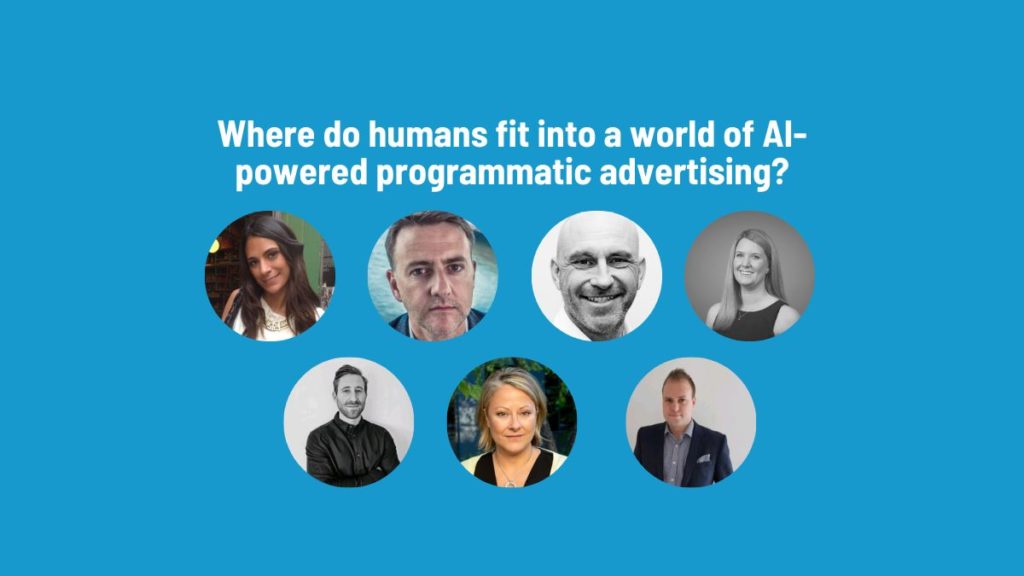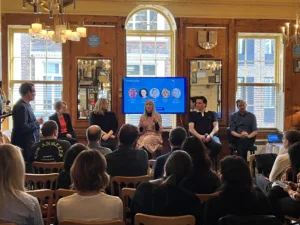The ever-increasing complexity of the digital media landscape is prompting more advertisers to rely on programmatic platforms with powerful Artificial Intelligence (AI) capabilities. However, within such a tech-heavy setting, will human beings still have a meaningful role? What’s more, in 2022, is the programmatic advertising industry getting any better at looking after the mental health of its people?
These were just some of the issues discussed by a panel of industry experts at a recent roundtable, organised by New Digital Age (NDA) in association with Scibids. NDA’s editor Justin Pearse chaired the discussion, where he was joined Scibid’s UK Managing Director, Matt Nash, plus; Lina Angelides, Head of Programmatic, OMD UK; Steve Taylor, Joint Chief Strategy Officer, VCCP Media; Jacques Edeling, Head of Programmatic at Starcom; Alexis Faulkner, Chief Digital Officer, Mindshare UK; Virginie Goupilleau, Managing Partner, Xaxis UK; and Richard Kanolik, Head of Programmatic, Vodafone.
Jacques Edeling of Starcom opened this section of the discussion by affirming the ongoing need for human talent at the heart of the programmatic ecosystem. He said: “We’ll always need good buyers to execute our media plans. You can’t just plug this stuff in. You need to properly engage with publishers, engage with SSPs and DSPs, work out the best structure. Good traders are the ones to think things through, make optimizations, really get involved. The good news is that, today, you can have massive automation working hand-in-hand with those talented humans to deliver real uplifts in performance.”
Matt Nash of Scibids (which creates custom algorithms for digital advertisers to deliver bidding efficiencies and performance improvements) agrees that the ‘human touch’ is still required to get the best out of even the most sophisticated Artificial Intelligence tools.
“We work in partnership with our clients, and our focus is on the on ad decisioning aspect of a campaign, one area powerful AI has a clear advantage” said Nash. “We work with smart people who understand their client’s goals and devise the best way to achieve those within the campaign set up and available data. Our role is to maximise the potential of the setup that they’ve created. We are a turnkey ‘execution layer’ designed to make the campaign setup work as hard as possible to drive the desired business outcomes. More and more brands are moving away from just looking at the DSP metrics to base their decisions on. Many want to use other forms of privacy–compliant data to optimise towards the outcomes they really care about. More clients than ever are asking us to ingest additional data sets, 1st party or otherwise, into our AI and optimise bidding against those.”
People who know people
Richard Kanolik of Vodafone argued that marketers need wider stakeholder buy-in, beyond the traders using the platforms, to get the most out of programmatic. He said: “Traders can sometimes naturally be introverted as people and they just want to get their heads down, while others are happy to go out and talk to clients or other internal teams. When I previously worked at a big agency, I noticed that the accounts teams delivering the best results were the ones where there was a camaraderie, a relationship between digital and non-digital stakeholders and a blended effort to understand programmatic across the team. This took some of the pressure off the more introverted traders and let them concentrate on what they did best.”
Likewise, Virginie Goupilleau emphasised the increasing importance of collaboration in delivering on the potential of AI-based buying solutions.
“Brands will always be attracted to a black box that promises the ability to hit the button and go but, at the same time, those brands are missing out. They’re not getting the same level of value or the same level of forward thinking that’s achieved by advertisers, agencies and ad tech providers working together. When we are aligned and there is a shared strategic direction between teams of different talents, that’s when we can create truly magical things.”
A healthy outlook?
The digital marketing industry has not always had a great reputation for safeguarding the well-being of its workforce. With mental health issues increasingly in the media spotlight, is the programmatic industry doing more to safeguard those working at the sharp-end of technological innovation and change?
“I’m conflicted on the subject,” said Alexis Faulkner Chief of Mindshare UK. “On the one hand, almost all big agencies have introduced flexible working policies and various initiatives to support mental health. The part of the agency model that we haven’t fixed yet is the tendency to overwork our teams. The pandemic demanded increased flexibility, which invariably meant more planning and more work at the agency level. We need to get better at recognising when excessive workload is creating challenges for individuals.”
On the subject of supporting the mental health of digital marketing teams, Steve Taylor of VCCP Media commented: “As a leader, one thing you can do that really makes an impact is to create a culture of belonging. We have a lot of very different people working for us. Programmatic people, data people, search people – they don’t always fit a particular mould. They don’t necessarily want to fit into what used to be very typical agency cultures, which were quite boozy, young and loud. Trying to build a culture which makes those people feel that they belong and can be authentic is a really valuable thing to do.”
Lina Angelides of OMD UK summed up the discussion by placing ‘human understanding’ at the centre of future success in the AI-powered world of programmatic advertising and calling on employers to outsource certain tasks in times of need.
She said: “If you understand your team really well, and you can see that someone is a bit obsessed with data and doing a good job, maybe don’t force them to go to that lunch appointment they’re not interested in. Also, as an agency, we work with so many suppliers and have really good relationships with them. There are lots of resources out there to help us when we have traders with too much work on.”
Read the first part of this roundtable discussion here.









